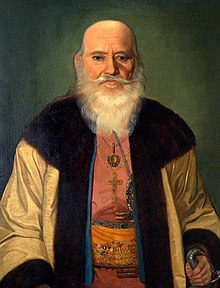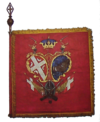| This article includes a list of general references, but it lacks sufficient corresponding inline citations. Please help to improve this article by introducing more precise citations. (September 2024) (Learn how and when to remove this message) |
| Matija Nenadović | |
|---|---|
| Матија Ненадовић | |
 | |
| Prime Minister of Serbia | |
| In office 27 August 1805 – April 1807 | |
| Monarch | Karađorđe |
| Preceded by | Position established |
| Succeeded by | Mladen Milovanović |
| Personal details | |
| Born | (1777-02-26)26 February 1777 Brankovina, Ottoman Empire (present-day Serbia) |
| Died | 11 December 1854(1854-12-11) (aged 77) Valjevo, Principality of Serbia |
| Political party | Independent |
| Awards | Order of Glory |
| Signature | |
Matija Nenadović (Serbian Cyrillic: Матија Ненадовић, or Mateja Nenadović Serbian Cyrillic: Матеја Ненадовић; 26 February 1777 – 11 December 1854), also known as Prota Mateja, was a Serbian archpriest, writer, and politician who served as the first prime minister of Serbia from 1805 to 1807. He was a notable leader in the First Serbian Uprising.
Life

At the age of sixteen he was ordained priest, and a few years later was promoted to an archpriest (Serbian: Протојереј), colloquially prota (Serbian: прота) of Valjevo. His father, Aleksa Nenadović, Knez (chief magistrate) of the district of Valjevo, was one of the most popular and respected public men among the Serbs at the beginning of the 19th century. When the four leaders of the Janissaries of the Sanjak of Smederevo (the so-called Dahias) thought that the only way to prevent a general rising of the Serbs was to intimidate them by murdering all their principal men, Aleksa Nenadović (1749–1804) was one of the first victims. The policy of the Dahias, instead of preventing, did actually and immediately provoke a general insurrection of the Serbs against the Turks.
Prota Mateja became the deputy-commander of the insurgents of the Valjevo district (1804), but did not hold the post for long, as Karađorđe sent him in 1805 on a secret mission to St. Petersburg, and afterwards employed him almost constantly as Serbia's diplomatic envoy to Russia, Austria, Bucharest and Constantinople. After the fall of Karadjordje (1813), the new leader of the Serbs, Miloš Obrenović, sent Prota Mateja as representative of Serbia to the Congress of Vienna (1814–1815), where he pleaded the Serbian cause indefatigably. During that mission he often saw Lord Castlereagh, and for the first time the Serbian national interests were brought to the knowledge of British statesmen. Prota Mateja's memoirs (Memoari Prote Mateje Nenadovića) are the most valuable authority for the history of the first and Second Serbian uprising against the Turks.
He had a brother, Sima, a voivode. His paternal uncle, Jakov Nenadović, had an equally important role in Serbia, as the first Interior Minister. Mateja Nenadović had a son, Ljubomir Nenadović.
Nenadović was a Freemason.
Works
He is best known for his work The Memoirs of Prota Nenadović. He also authored other memoirs and documentary literature.
Legacy
He is included in the book The 100 most prominent Serbs.
See also
References
- "Početna". Velika Masonska Loža Srbije (in Serbian). Retrieved 7 April 2023.
Sources
- Milićević, Milan (1888). Поменик знаменитих људи у српскога народа новијега доба. Srpska kraljevska štamparija. pp. 408–412. (
 Public domain)
Public domain)  This article incorporates text from a publication now in the public domain: Chisholm, Hugh, ed. (1911). "Nenadovich, Mateya". Encyclopædia Britannica. Vol. 19 (11th ed.). Cambridge University Press. p. 371.
This article incorporates text from a publication now in the public domain: Chisholm, Hugh, ed. (1911). "Nenadovich, Mateya". Encyclopædia Britannica. Vol. 19 (11th ed.). Cambridge University Press. p. 371.- Srpska književna zadruga (1893). "Memoari Prote Matije Nenadovića". Srpska književna zadruga 9.
| Political offices | ||
|---|---|---|
| New title Serbian revolution |
Prime Minister of Serbia 27 Aug 1805 – Jan 1807 |
Succeeded byMladen Milovanović |
- People of the First Serbian Uprising
- Prime ministers of Serbia
- 19th-century Serbian historians
- Serbian male writers
- Serbian Orthodox clergy
- Nenadović family
- Writers from Valjevo
- 1777 births
- 1854 deaths
- Ambassadors to the Russian Empire
- Armed priests
- Politicians from Valjevo
- Clergy from Valjevo
- Serbian Freemasons

